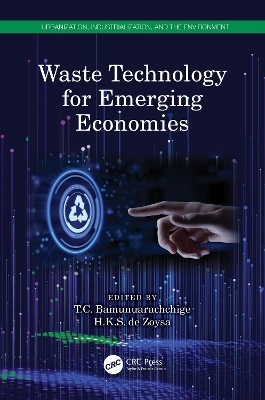
Waste Technology for Emerging Economies
CRC Press (Verlag)
978-0-367-67688-9 (ISBN)
This unique volume covers many aspects of waste management in developing countries. There is a focus on various sources of waste including the pressing issues of agricultural, medicinal, industrial, and urban waste, and emerging problems with e-waste, nanowaste, and microplastics in marine environments. This volume addresses the critical environmental issues resulting from rapid urbanization and industrialization, particularly in the developing world. High-end technologies that can utilize waste as a resource to generate products, processes, and revenue are also discussed.
Features
Presents technical perspectives on emerging wastes in developing economies
Discusses the issues of e-waste, which is growing three times faster than general municipal waste globally
Covers the spectrum of nanowaste to upcycling in the market
Discusses management of marine plastic debris and microplastics
Diverse audience including those in solid waste management, electrical and electronic technology, and the medical industry
Dr. T.C. Bamunuarachchige Dr. T.C. Bamunuarachchige is the present Head of the Department of Bioprocess Technology, Faculty of Technology, Rajarata University of Sri Lanka (RUSL). He has obtained his PhD in Microbial Biotechnology from the University of Peradeniya (UoP), Sri Lanka. He has been a member of the Working Committee on Biotechnology and Bioethics of the National Science Foundation (NSF) in Sri Lanka and the Program Coordinator for the Technology Degree programs conducted by the RUSL. Dr. Bamunuarachchige is a certified tutor mentor trainer in distance and continuing education. He has served as the Program Coordinator of the Distance education program from 2009-2012 at RUSL. He has supervised several postgraduate students in the fields of Microbial Biotechnology and Molecular Biology. He has a wealth of experience in writing proposals for competitive grants including World Bank and Asian Development Bank-funded projects. Dr. Bamunuarachchige is a certified peer reviewer under the Elsevier Researcher Academy and has served as a Reviewer for ten WoS journals. He is also an Editorial Board member of the Journal of Food Research International. His research mainly involves microbial biotechnology with a special focus on how to use waste material in the production of commercially important agricultural applications such as biopesticides and biofertilizers. Dr. H.K.S. de Zoysa H.K.S. de Zoysa is a Lecturer at the Department of Bioprocess Technology, Faculty of Technology, Rajarata University of Sri Lanka (RUSL). He earned his B.Sc. degree in Applied Biology and MPhil degree in Biological Chemistry from the RUSL, He has obtained his second master’s degree in Marine Biology from the University of Naples Federico II, Naples, Italy and currently follows a PhD in Biology at the same University. He has considerable experience in Applied Biology, Marine Science, Environment Management, Molecular Biology, Natural Products, Ecological and Biodiversity Conservation studies. He is a reviewer for many reputed journals and publishers. Most of Zoysa's current research is concerned with the marine environment and understanding the impact of waste and management to ensure ecosystem stability.
Chapter 1 Waste Management Challenges in Developing Countries
Chapter 2 Management of Medical Waste: New Strategies and Techniques
Chapter 3 Management of E-waste
Chapter 4 Management of Marine Plastic Debris and Microplastics
Chapter 5 Nanowaste Management
Chapter 6 Microbiology of Wastewater Management; Challenges, Opportunities and Innovations
Chapter 7 Phytoremediation: A Green Tool to Manage Waste
Chapter 8 Green Chemistry and Its Applications in Waste Management
Chapter 9 Bioenergy and Biofuels from Wastes: Perspectives from Developing Nations
Chapter 10 Upcycling: A New Perspective on Waste Management in a Circular Economy
| Erscheinungsdatum | 10.01.2023 |
|---|---|
| Reihe/Serie | Urbanization, Industrialization, and the Environment |
| Zusatzinfo | 26 Tables, black and white; 19 Line drawings, color; 14 Line drawings, black and white; 26 Halftones, color; 3 Halftones, black and white; 45 Illustrations, color; 17 Illustrations, black and white |
| Verlagsort | London |
| Sprache | englisch |
| Maße | 156 x 234 mm |
| Gewicht | 539 g |
| Themenwelt | Naturwissenschaften ► Biologie ► Ökologie / Naturschutz |
| Naturwissenschaften ► Chemie | |
| Technik ► Umwelttechnik / Biotechnologie | |
| ISBN-10 | 0-367-67688-5 / 0367676885 |
| ISBN-13 | 978-0-367-67688-9 / 9780367676889 |
| Zustand | Neuware |
| Informationen gemäß Produktsicherheitsverordnung (GPSR) | |
| Haben Sie eine Frage zum Produkt? |
aus dem Bereich


